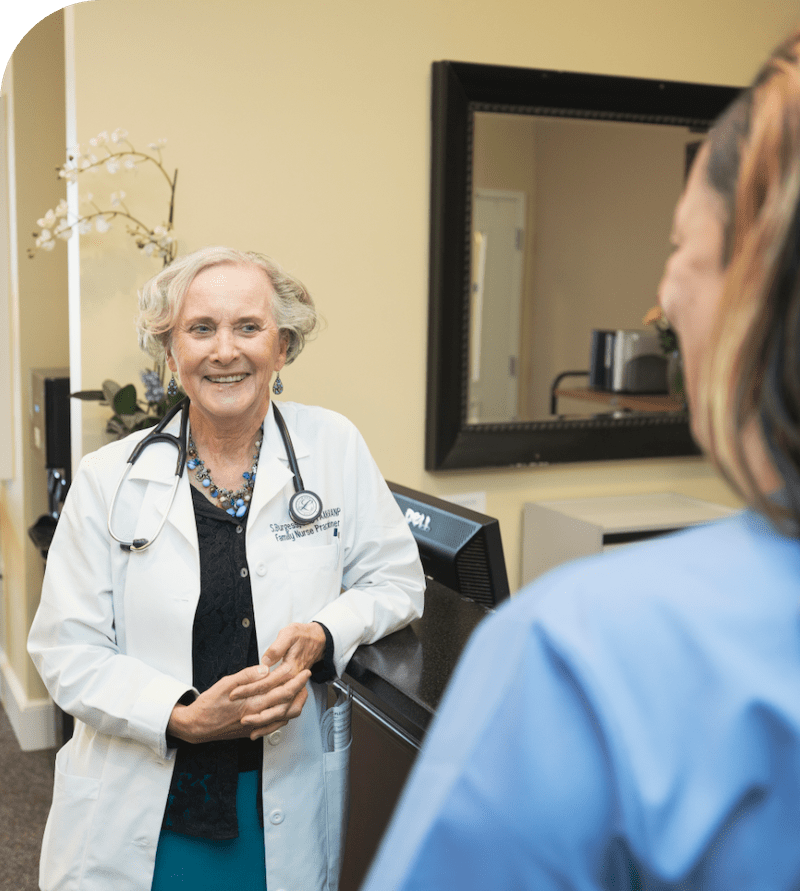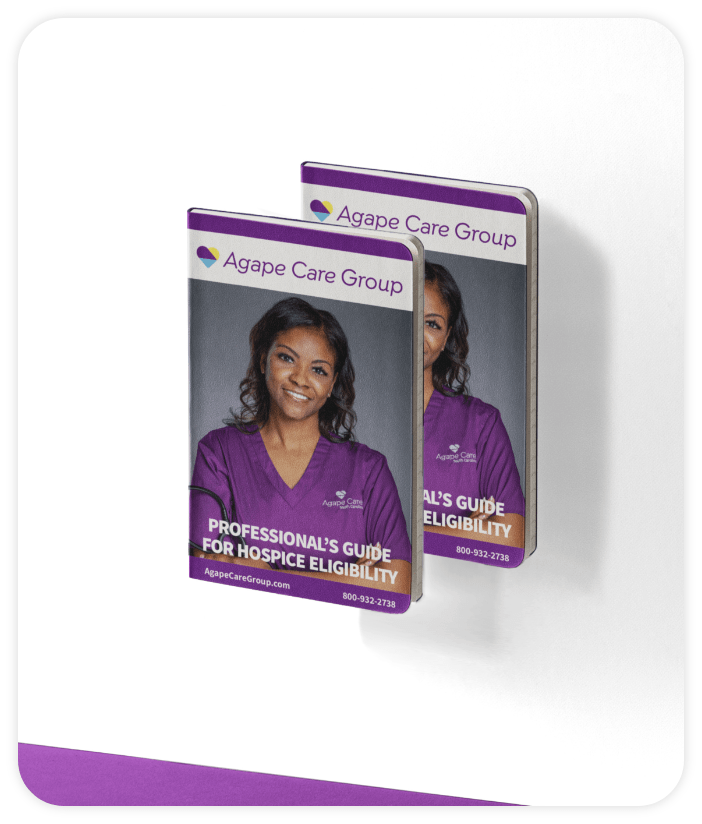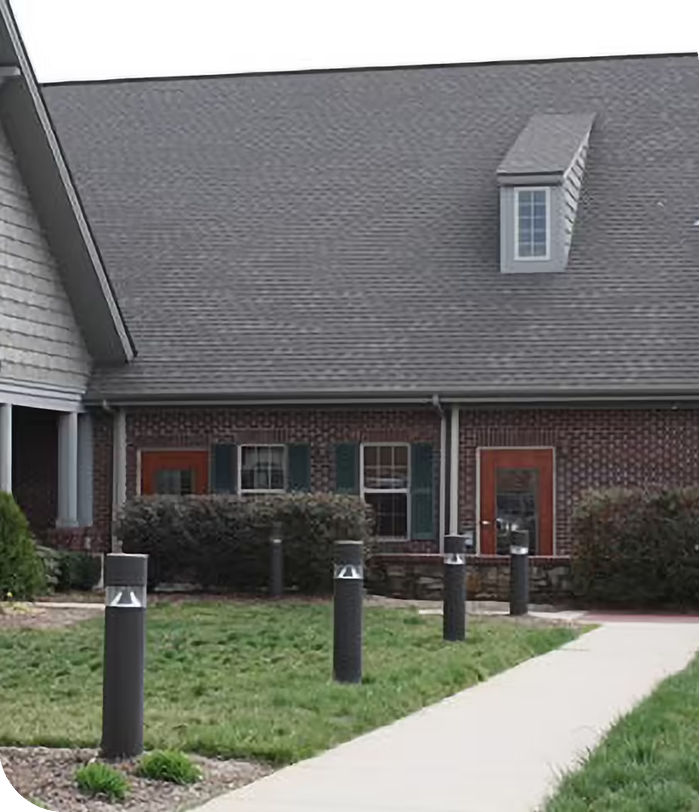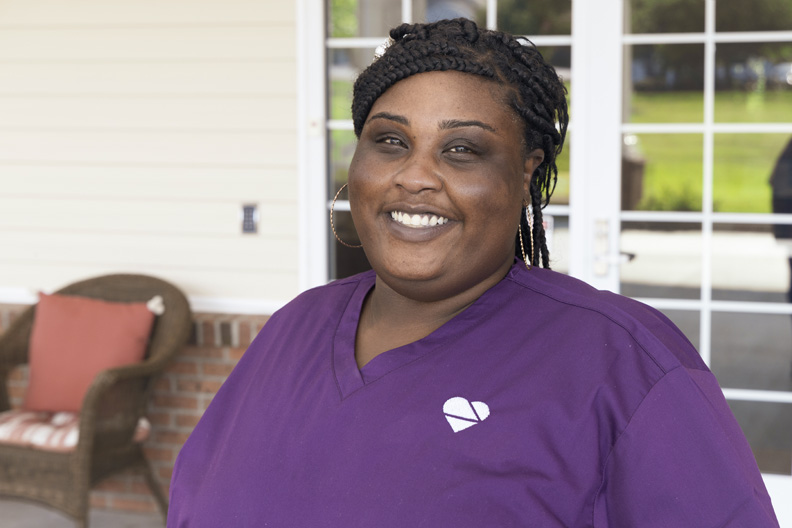The Partner of Choice for Hospice Care
We understand how challenging it can be to transition from curative care to hospice care. Our team will work closely with you to meet the medical and emotional needs of your patients while honoring their religious and cultural preferences and wishes for palliative, supportive care.

How Hospice Can Help
Hospice services are available to patients who no longer benefit from, and choose to forgo, curative treatment. The typical hospice patient has a life expectancy of six months or less, if the illness follows its expected course.
Patients who may benefit from hospice care are those in the final stages of any disease process, including chronic lung disease, congestive heart failure, AIDS, cancer, cardiovascular disease, Parkinson’s disease, Alzheimer’s and dementia, and other life-limiting, terminal illnesses.
Hospice offers help and support to the patient and their loved ones, 24 hours a day, seven days a week. For hospice patients, help is just a phone call away.
At Hospice of the Carolina Foothills, we’re committed to providing hospice services that ensure a superior patient-family experience, whether at home, in a hospital, or in a facility such as a nursing home or assisted living community.
Patients routinely receive scheduled periodic in-home services of a nurse, hospice aide, social worker, chaplain and volunteer.
The Care Team
Registered
Nurse (RN)
Registered
Nurse (RN)
Provides care including assessment, planning, and evaluation of patient needs. The nurse maintains open communication between the physician and hospice team.
Certified Nursing
Assistant
Certified Nursing
Assistant
Helps with personal needs such as feeding, bathing, dressing, basic housekeeping and companionship.
Social
Worker
Social
Worker
Helps make decisions about care options available within the community, provides guidance on advance care directives, financial concerns, and other emotional needs.
Hospice
Physician
Hospice
Physician
Provides medical direction to the team.
Chaplain
Chaplain
Available for nondenominational spiritual support and guidance that honors the patient’s beliefs and values.
Grief & Loss
Counselor
Grief & Loss
Counselor
Provide support throughout the grief experience, maintaining contact with the patient’s caregivers and loved ones.
Volunteer
Volunteer
Available to support in a variety of ways including personal care, errands, light housekeeping, reading, assistance with meal preparation and companionship.
Four Levels of Comprehensive Care
Hospice patients require differing intensities of care during the course of their disease. The hospice benefit affords patients four levels of care to meet their clinical needs:
This level of care is provided in the patient’s place of residence — in a private home, an assisted living community, a skilled nursing or long-term care facility, or another residential setting. Under routine care, the patient receives regular scheduled visits from members of their care team, based upon their specific needs. As the patient’s needs change, team members adjust their visits to accommodate these changes and ensure optimal care.
If a patient experiences acute symptoms that cannot be safely managed in the home or other residential setting, they may require a higher level of care called general inpatient (or GIP) care. GIP care may be provided in a contracted skilled nursing facility or a hospital. Once symptoms are under control, the patient may return to their home under the routine level of care.
Many patients have their own caregivers. If the caregiver needs a rest from their caregiving responsibilities, respite care is available. Under respite care, a patient may stay in a Medicare-certified facility or other inpatient center for up to five days.
Sometimes a medical crisis occurs that requires a higher intensity of care. When this happens, skilled care may be brought into the patient’s home for up to 24 hours to possibly avert the need for a hospital visit. When the crisis is over, they can return to routine care.
Our hospice care
plans are designed to:
- Support the patient and their family in understanding their options for care
- Manage pain and discomfort
- Provide medical needs and equipment
- Offer spiritual assistance
- Facilitate communication


Comfort Care at the Right Time
Grief Support
We also provide comprehensive grief support services for the family members of our patients for up to a year after the loss of a loved one. The emotional and psychological consequences of losing a loved one should never be underestimated.
The goal of grief support is to facilitate a safe and healing environment for people who are adjusting to a significant loss in their lives. Through our grief support services, we hope to help families celebrate the life of a loved one and process any feelings of loss. Our grief care is extended to family members and other significant persons both before and after the death of a hospice patient.
Hospice Eligibility Guidelines
At Hospice of the Carolina Foothills, we’re with you as your care partner, and we’re committed to providing hospice services that ensure a superior patient-family experience. These guidelines, which are also available as a pocket guide below, are meant as a tool to help determine whether a patient is eligible for hospice care.

Inpatient Hospice Care
When a patient’s medical needs exceed what caregivers can provide and in-home care is no longer an option, we have four hospices houses available throughout the state. Patients receive state-of-the-art medical care and pain and symptom management from experienced teams.
For families, these spaces provide peace of mind and ease the burden of providing care. Each center offers a serene atmosphere where patients and families alike will experience unconditional love and compassion.
Inpatient hospice care includes 24/7 nursing care, room, board, and medical services and equipment that are necessary for your loved one to remain comfortable in their remaining days.
Other services provided
by inpatient hospice care include:
Pain management and comfort. We do everything we can to make sure that patients are cared for with the dignity they deserve. Our experienced and skilled staff members are able to provide the palliative treatment necessary to control the associated pain and discomfort.
Emotional and spiritual support. We offer multicultural, faith-based services designed to support patients throughout their journey.
Counseling and training for family members. We know that supporting a loved one with serious illness can have a tremendous impact on families. In addition to training family members in the best ways to interact with and care for their loved one, our professionals are able to offer counseling.
The Best in Comfort and Care
Hospice House
Every Hospice of the Carolina Foothills hospice house provides compassionate and comforting care in a family-like environment. We combine the professional skills of doctors, nurses, nursing assistants, social workers, and chaplains, along with our caring volunteers. Hospice of the Carolina Foothills hospice houses are spacious centers, located in serene, natural settings. Our goal is to provide an environment where all can experience unconditional love, compassion, and dignity.

Improving Patient Care with Innovative Technology
Providing excellent care is just the start. We know that being a top-notch provider is about creating a fulfilling experience throughout the entire process. We believe that in order to be seen as an advanced health care provider, we have to utilize the advanced health care technologies available to us.
According to a recent study by The Journal of the American Medical Association (JAMA), 12.3% of patients on routine hospice care in the home received no skilled visits in the last two days of life.
To help address this issue, Hospice of the Carolina Foothills adopted predictive modeling technology from Muse. Leveraging Muse technology, Hospice of the Carolina Foothills may more accurately predict end-of-life transitions to ensure the right level of care for patients in the last seven to 12 days of life.
We have chosen to invest in and implement three leading health care technologies, integrating Trella Health, Homecare Homebase, and Muse Healthcare allows us to efficiently manage our team and patients as well as ensure complete and accurate documentation.
These tools enable us to more accurately predict when patients will transition, helping our care teams to ensure patients and their families receive the care that matters most in the final days and final hours of a patient’s life.
Ensure your patients receive vital care at the right time.
Hospice visits when death is imminent: At least 1 visit in the last 3 days of life (Registered Nurses, Physicians, Nurse Practitioners, or Physician Assistants)
Source: Strategic Healthcare Programs, Medicare Claims

What You Can Expect
You can rely on our team to deliver the highest clinical quality and the best patient/family experience. Partnering with us means access to:
Simple referral process
Customized care plans for your patients
Close coordination of care
24/7 call coverage
Patient consultations on advanced care planning
Palliative physical and occupational therapy for your patients
Contracted, registered dietitian services
Quality assessment process improvement team
Corporate compliance officer certified in health care compliance
Continuing education
Resources for health care professionals, including advance care planning, overseeing the care plan and 11th-hour crisis assistance
Education on prognosis and disease progression
When families find themselves facing a health crisis, the person to whom they look for advice and assurance is the physician. Because of this, physicians must be comfortable being an important active part of that journey. We can help you and your team meet the needs of your patients and their families at this sensitive time in their lives.
